Interview for The Game’s Afoot, a Sherlock Holmes Comedy at Lyric Stage
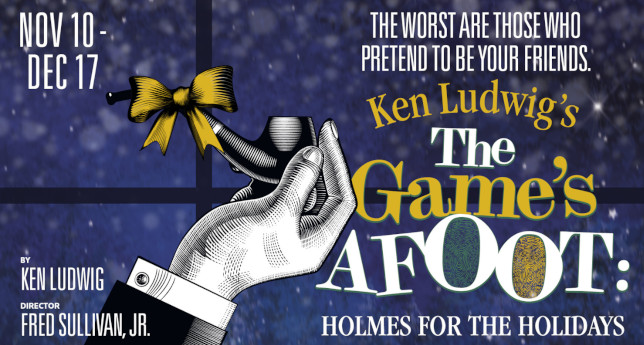
Now playing at Lyric Stage in Boston, The Game is Afoot is a hilarious comedy set in New England, at the mansion of William Gillette, the first famous actor to portray Sherlock Holmes.
When one of Gillette’s glitzy and glamorous guests is stabbed to death, the survivors are trapped! It’s a slapstick murder mystery that will keep you laughing and guessing.
Remo Airaldi, an iconic Boston actor and Harvard professor, and who plays Felix Geisel in the show, very kindly agreed to an interview.
Events INSIDER: Your new production, The Game’s Afoot, isn’t the first time that you’ve had a Sherlock Holmes comedy. The first time that I saw you on stage was in 2010 with The Hound Of Baskervilles.
Remo Airaldi: Sure. At Central Square.
Events INSIDER: It’s was absolutely the funniest play I have ever seen.
Remo Airaldi: Oh, how sweet. Oh my gosh.
Events INSIDER: Never mind New York, the West End, whatever. The best comedy. Just brilliant.
Remo Airaldi: Oh, how nice. It was a fun show to do. That was directed by my dear late friend, Tommy Derrah. He was at A.R.T. with me, and he just loved that play and he wanted to direct it.
And he says, “You want to play Sherlock Holmes?” I’m like, “Sure.” I knew nothing about the play and I ended up loving it, and it was just a wonderful, wonderful experience. Yeah, I remember it fondly.
Events INSIDER: So now you’re coming together to do it again, with playwright Ken Ludwig, who himself previously wrote a Sherlock Holmes comedy, Baskerville: A Sherlock Holmes Mystery.
Remo Airaldi: Yes.
Events INSIDER: So, The Game’s Afoot is based on old time actor William Gillette, and set at his mansion in Connecticut, which is open to tourists.
Remo Airaldi: Yes. I knew nothing about William Gillette when I started this.
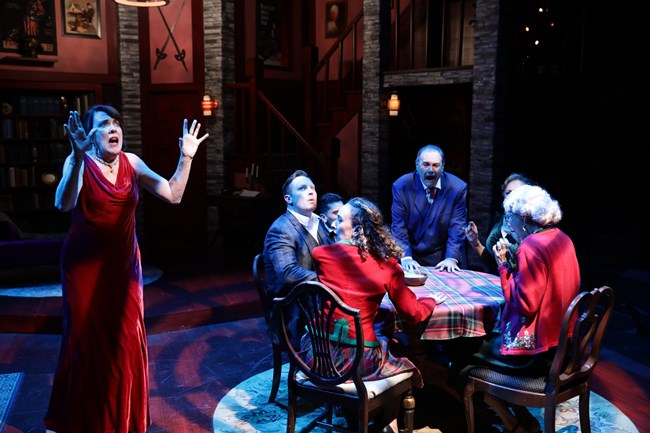
Events INSIDER: Have you been there, to the castle?
Remo Airaldi:: No, but Fred Sullivan, Jr. Who directed it, the week before we started rehearsals on a Sunday, he went with his husband and took a lot of pictures. And obviously in the set design for the show, there are little homages to the castle.
But the pictures are unbelievable. It’s a castle. It’s unbelievable, and in the set we’ve incorporated that stone thing, but that revolving thing and the catacombs?
Events INSIDER: I have been there. It’s an amazing building.
Remo Airaldi:: Yeah, it’s unbelievable. And then that railroad that he built, he was just an amazing person. I liked the fact that he was an actor manager and that he really came from a very rich family and decided on his own that he wanted to be on stage.
Events INSIDER: Oh, really?
Remo Airaldi: Oh, yeah. I want to say both his siblings had passed away before him, so his family was very nervous about him just becoming an actor, but they actually supported him in that. But he made so much money.
Events INSIDER: It was successful. He portrayed Sherlock Holmes and it wasn’t just a vanity project. It was very successful.
Remo Airaldi: Yeah, no, no. Hugely. He was a very good businessman.
Remo Airaldi: And Ken Ludwig touches on this in the play, he was interested in technology, new technology. There’s a bit in there about a speakerphone and about him using microphones and audio taping conversations. And he was really, really interested in technology. And when you read about the plays that he [William Gillette] directed, the thing that strikes you is that he introduced a lot of new technology in terms of sound effects and lighting effects.
Remo Airaldi: And whenever you read any of those reviews of the Sherlock Holmes plays that he did, people always talk about the amazing effects. And he pretty much came up with them all on his own!
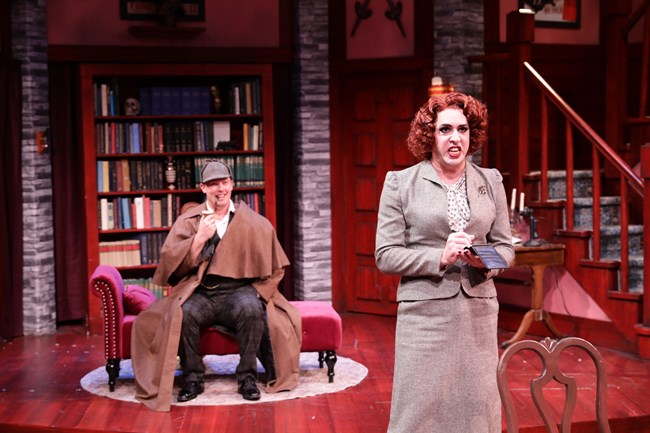
Events INSIDER: Comedy doesn’t get as much attention during award season, but it is perhaps the hardest form of acting because the physicality is not in the script, the time is not in the script. Can you comment about how you and the whole crew cast develop the comedy for this play?
Remo Airaldi: Yeah, that’s a great question. You’re right. And Ken Ludwig is particularly, I would say, stingy in terms of his stage directions. Some playwrights will write out a whole very specific, we call them “lazzis”, which are comic routines. Comic routines, yes.
Remo Airaldi: And a lot of playwrights will write them very specifically. Ken does not. He just basically writes, “Here’s a routine,” and he leaves it up to the actors to come up with it. So in terms of this particular cast, it’s been great to have Fred Sullivan. I have to say. Did you see the play That Goes Wrong last year?
Events INSIDER: I did not, I’m afraid.
Remo Airaldi: Oh, wow. He [Fred Sullivan] did a great… Yeah, he did a fantastic job there with it. And that play is all about comic timing. And so he just has it in his bones. He’s done a lot of comedies in his life. He’s also a wonderful director of drama. But he always said, and he’s absolutely right, physical comedy is mathematic. It’s like we have to work it out beat by beat by beat. We can’t improvise any. We can improvise in rehearsal, but once we set it, it’s got to be perfect timing.
Remo Airaldi: It’s something we’ve built together, and if the timing is even slightly off, you hear it in the laugh. The laugh is not quite there. So it’s mathematics. And we have three weeks to put this play together, and we just routined it and routined it and routined it and routined it until it feels second nature.
Remo Airaldi: Now, the challenge is, well, when you’ve routined something so much, how do you still make it seem like it’s happening for the first time? Because that’s the trap you can fall into. Then I do this, then I touch you on the shoulder, and then I do… Everything is very choreographed. But within that, we still have to find what we call the beginner’s mind, like it’s happening for the first time. Otherwise it’s just a dance, and that’s not what we want.
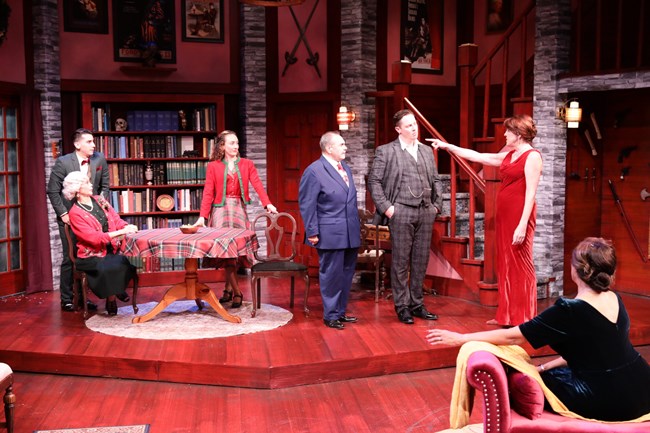
Events INSIDER: Tough question time. I’m sorry!
Remo Airaldi: Of course. Of course.
Events INSIDER: Every year the Commonwealth Shakespeare Company does an outdoor play on Boston Common. You’ve been in many of them.
Remo Airaldi: Yes. Right.
Events INSIDER: When Shakespeare is translated into Spanish, it’s translated into modern Spanish. In English, well, the old time English is incomprehensible.
Remo Airaldi: Well, a couple of thoughts or comments. The first one is Spanish is my first language.
Events INSIDER: Right, you’re from Peru!
Remo Airaldi: From Peru, that’s right. And so I didn’t really learn English until I was about 15 years old. And it’s amazing to me that these plays, the Shakespeare plays work. Because people always say, well, these plays are about the language, it’s poetry, it’s about the language and language. But even when they’re translated, the plays still have power to them. But you’re right, they’re translated into modern language [in foreign languages, but not in English].
Events INSIDER: If the goal of CSC is to attract people to theatre, perhaps disadvantaged people who can’t afford theatre or people who wouldn’t normally see theatre… Shakespeare is so incomprehensible. The old English literally cannot be understood. How about more modern plays?
Remo Airaldi: As someone who loves Shakespeare, I really believe that if the actors are good enough, you’re not going to understand every single word. You just won’t. And that’s a given. But you will understand the gist of what’s happening. And if the actors are good enough, I think they can carry you along. Of course, we cut, we change things. If a certain word is just something that no one would get or a certain part of the play is something that is so obscure that no one would get, we take it away.
Remo Airaldi: But there is something that feels a little icky, I have to say, about changing these words because they’re so beautiful if you look at them. But you’re right, it’s a tension that we always deal with as actors, especially people who do a lot of classics. We want people to be excited about them, we want diverse audiences to come in, but we also want to respect the playwright. And so we don’t want to dumb it down.
Remo Airaldi: But ultimately, I do believe that if the actors are strong enough, and I always tell this to my students, I teach acting Shakespeare at Harvard, and I always say to them, “If you know exactly what it is you’re saying, if you’ve done your work, the audience will understand what’s happening.” I think what often happens is that actors sometimes have a gist, a general sense of what they’re saying, but they don’t know specifically what they’re saying.
Remo Airaldi: And that’s when we get into trouble. That’s when an audience is like, “I don’t get it.” But if an actor is really specific enough, and of course we can help with physicality. That’s the beauty of the difference between reading a Shakespeare play and watching a performance of a Shakespeare play, is that the actors serve as intermediaries.
Remo Airaldi: So if you’re reading it, it can seem like, my God, what is going on? I have no idea what this means. But when you watch an actor embody these words and use their physicality to help convey the meaning of what is happening, then to me, it is something that can work for most people.
Remo Airaldi: But I totally respect your point of view. My sister tells me the same thing because she comes to see me in Commonwealth Shakespeare, and she says, “Well, it was good, but I didn’t understand a lot of it.” And I’m like, “I know, I know.”
Events INSIDER: Maybe we’ll see A Raisin In The Sun, or A Streetcar Named Desire on the Boston Common someday. Of course, there are a lot of small theaters that already produce alternative outdoor summer plays, though not in that central location.
Remo Airaldi: Of course, of course. But even in 400 years from now, someone will look at Raisin In The Sun and be like, maybe we should modernize it. And to me, again, I always think of a playwright who has thought about every single comma and period, and every single line and every single word that they put down, and there’s something that just doesn’t feel right about just saying, well, you know what? Let’s change this word to that word, and let’s just modernize it. Yeah. But I get your point. Maybe I’m just too old.
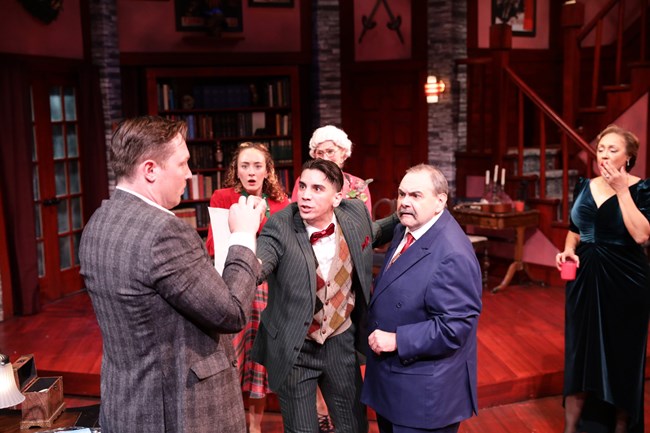
Events INSIDER: Thank you for your time. Your first Sherlock Holmes comedy was like a lightning strike. It kept me laughing just to think back on it. I’m really looking forward to The Game’s Afoot.
Remo Airaldi: Well, I’m flattered. I think it’s a fun show. Listen, it’s not rocket science. It’s intended to be a fun, very light show.
Events INSIDER: Ah, but you can draw people into theater who wouldn’t normally go to theater.
Remo Airaldi: Exactly.
Events INSIDER: So it serves a purpose as well.
Remo Airaldi: Exactly. Yes. And I think it’s a good show for the holidays, so there you go.
Events INSIDER: Thank you.
Remo Airaldi: Thanks, Johnny. Bye-Bye.
The Game’s Afoot runs now through December 17 at Lyric Stage.
For more, see lyricstage.com.